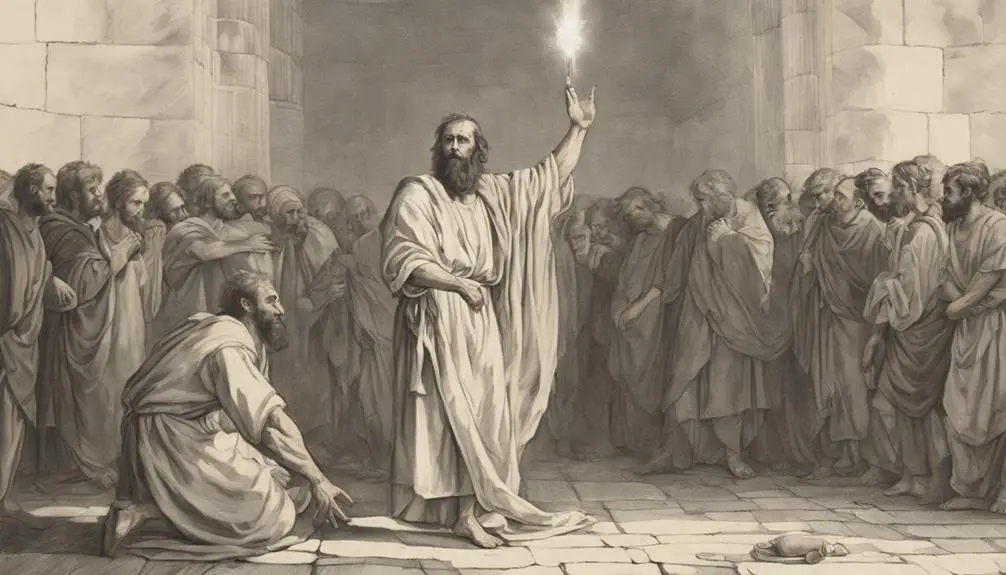Yearning for meekness? Explore profound examples from the Bible and discover how to embody this virtue in your everyday life.

Example of Meekness in the Bible
Just as you're pondering on the virtue of meekness, coincidentally, the Bible provides us with profound examples. Have you ever considered Moses, who despite being referred to as the meekest man on earth, led an entire nation?
Or how about David, who in the face of adversity, displayed tremendous humility?
But what could these narratives possibly offer you in your modern, everyday life? Well, in understanding these biblical figures, you might uncover a path to embodying meekness in your own experiences, sparking a transformation you may not have thought possible.
Key Takeaways
- Prominent biblical figures such as Moses, David, Jesus, Paul, and Joseph demonstrate the virtue of meekness through their actions and choices.
- Traits of meekness include patience, humility, respect, forgiveness, and the willingness to serve and sacrifice for others.
- Meekness doesn't equate to weakness; it is a strength that showcases endurance, faith, and the ability to forgive.
- The practice of meekness can offer vital life lessons, such as prioritizing the needs of others, seeking forgiveness, and enduring adversities with patience.
Moses: A Meek Leader

Although often overlooked, Moses, one of the most impactful leaders in the Bible, exemplified meekness throughout his journey, setting a profound example of humble leadership for all to follow. Moses' leadership style, characterized by patience and submission, was pivotal during the Israelites' time in the wilderness.
You'll note that Moses' patience in the wilderness wasn't a sign of weakness, but rather, a testament to his strength and faith. He patiently endured decades of hardship, leading a fractious and often ungrateful people through a barren desert. His ability to remain composed and steadfast in the face of adversity revealed a depth of character that was truly remarkable.
He didn't assert his authority with arrogance or aggression, but with humility and a deep sense of duty. His actions consistently demonstrated his meekness, not through passivity, but through his willingness to put the needs of his people before his own. He listened, he empathized, and he guided.
Through his example, Moses illustrates that true leadership isn't about power or control, but about service and sacrifice. His story serves as a powerful reminder that humility and patience, even in the face of great challenges, are the hallmarks of a truly great leader.
David's Humility in Adversity

Turning to another biblical figure, we can see a similar display of humility and strength in the life of David, particularly in his response to adversity. David's humility wasn't a passive acceptance of circumstances, but rather, an active submission to God's will, even in the most trying times.
Consider the period of David's life under Saul's influence. Despite Saul's relentless pursuit to kill him, David refused to retaliate. He recognized Saul's anointed position and chose respect over revenge, embodying humility in adversity. This wasn't an act of weakness, but a profound example of meek strength.
David's repentance also demonstrates his humility. After his sin with Bathsheba, David didn't justify his actions or shift blame. Instead, he confessed, repented, and sought God's forgiveness. His Psalm 51 is a heartfelt cry for mercy, revealing a contrite spirit that recognized his wrongdoings. He humbled himself before God, acknowledging his sin and seeking pardon.
Jesus: The Ultimate Example

Shifting our focus to the New Testament, we find Jesus Christ as the personification of meekness and humility, setting the ultimate example for believers to follow. His life, fraught with trials and tribulations, is an epitome of Divine Humility and patient endurance. Remember, you're called to emulate His example.
Consider Jesus' patience during His earthly ministry. He patiently endured scorn and rejection, even from those He came to save. His patience was never a sign of weakness, but rather a testament to His strength and His unyielding commitment to His Father's will.
Now, let's delve into His Divine Humility. Despite being God incarnate, Jesus chose a life of service, washing His disciples' feet, a task typically performed by the lowest servant. He willingly accepted the humility of the cross, enduring unimaginable suffering for humanity's redemption. This Divine Humility isn't about belittling oneself, but rather recognizing and accepting the will of the Father, even when it led to personal pain.
Paul's Transformation to Meekness

While pondering on Jesus' example, it's quite enlightening to reflect on how Apostle Paul, initially a fierce persecutor of Christians, underwent a radical transformation to exemplify biblical meekness. Known as Saul before his conversion, he was a zealous defender of Jewish law and traditions. In what can be described as a dramatic turn of events, Paul's conversion on the road to Damascus triggered this Apostle's change, leading to a life devoted to spreading the Gospel.
This transformation wasn't simply a change of heart, but a complete reorientation of Paul's life and purpose. His humility, patience, and gentleness – the hallmarks of biblical meekness – became evident in his interactions with others, despite facing numerous trials and tribulations. He was no longer the harsh persecutor, but rather an embodiment of Christ-like meekness, ready to suffer for the sake of righteousness.
Paul's transformation offers a profound lesson on the power of divine intervention and the transformative potential of faith. His journey from persecutor to an apostle of Christ serves as a vivid example of meekness, proving that anyone, regardless of their past, can be remodeled by God's grace.
Living Meekness: Lessons From Joseph

Delving into the life of Joseph, another biblical figure, we can glean significant insights on the practice of meekness in daily living. Joseph's story showcases an abundance of meekness. His dream interpretation abilities, for instance, weren't used to gain personal power or prestige. Instead, he used this gift to save Egypt from famine, demonstrating humility and self-restraint.
Joseph's meekness is further highlighted in his interaction with his brothers. Despite their previous ill-treatment, Joseph's sibling forgiveness was profound, displaying a strong sense of humility and understanding. Rather than seeking vengeance, Joseph chose to forgive and provide for his brothers, a prime example of living meekness.
Joseph's life offers two main lessons. Firstly, gifts or abilities shouldn't inflate one's ego but rather be used for the benefit of others. Secondly, forgiveness, even in the face of grave wrongs, is crucial in practicing meekness.
In essence, Joseph's actions epitomize meekness in the Bible. The subtlety of his dream interpretation skills, coupled with his ability to forgive his brothers, underscore the importance of humility and forgiveness in daily life. Emulating Joseph, you too can practice and embody meekness in your life.
Frequently Asked Questions
What Is the Biblical Definition of Meekness?
You may have misconceptions about meekness, but biblically, it's not about being weak or passive. In fact, it's strength under control, a mix of gentleness and humility.
It's a character trait valued by God, and it comes with rewards. It's about taming your own power, using it not for self-interest but for the good of others.
Understanding this definition can change how you view and practice meekness in your daily life.
How Does the Concept of Meekness in the Bible Differ From Modern Interpretations?
You might find that meekness misunderstandings arise when comparing biblical and modern interpretations.
In the Bible, meekness isn't weakness, but strength under control, a virtue of restraint.
However, today's society often views meekness as passivity or lack of courage.
This meekness evolution might lead to misconceptions, underscoring the importance of contextual understanding when interpreting biblical concepts.
Are There Any Female Figures in the Bible Known for Their Meekness?
Yes, there are several female figures known for their meekness in the Bible. Notably, the Proverbs 31 woman is seen as a model of meekness, demonstrating strength and dignity while maintaining a gentle spirit.
Sarah, Abraham's wife, is also praised for her submissive nature and respect towards her husband, showcasing the virtue of meekness in her marital relationship.
These women epitomize the biblical understanding of meekness.
How Can One Practice Meekness in Daily Life According to the Bible?
You can practice meekness in your daily life by following biblical teachings. Cultivate meekness by exercising humility and patience, especially in relationships.
Don't retaliate when wronged, instead forgive and show understanding. Practice self-control, avoid anger, and embrace peace.
Remember, meekness isn't weakness, it's strength under control. Reflect on the Bible's teachings to guide your actions and attitudes.
Cultivating meekness will lead to a more harmonious and fulfilling life.
What Is the Relevance of Meekness in Contemporary Christian Life?
In contemporary Christian life, meekness has immense relevance. It's essential in leadership, as it fosters humility, patience, and understanding. You can't lead effectively without these qualities.
Meekness also plays a crucial role in social justice, promoting empathy and compassion towards those who are marginalized or oppressed. It's not about being weak, but rather, choosing kindness over aggression.
It's a powerful, transformative quality that can make a significant impact in our world today.
Conclusion
In conclusion, you've seen meekness exemplified through biblical figures like Moses, David, Jesus, Paul, and Joseph. They've shown strength in humility, integrity amid adversity, and transformative love.
Their lives echo the truth that meekness isn't weakness, but a powerful restraint. By emulating their examples, you too can cultivate a spirit of meekness in your life, and profoundly impact the world around you, just as they did.



Sign up